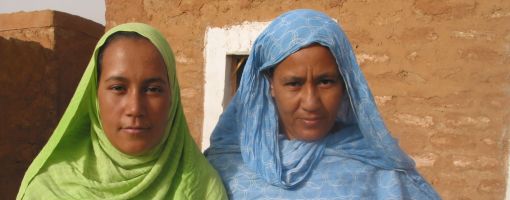
My name is Lamira and I was born in 1988 as a refugee. I spent my childhood in a camp called Dakhla in southern Algeria, which is one of five camps for refugees from Western Sahara. I lived there with my mother, and I have no brothers or sisters.
The Saharawi refugee camps which are all linked to each other in order to allow better management of their inner structures. They have existed for about thirty years, and have gone from being simple assemblies of tents to becoming structured as real cities with hospitals, schools and shops. Nevertheless life there is tough. The famines and the great heat temperatures surpass 50 parts of the year - are the things I experienced during my childhood that have made the deepest impression. I dont feel that situation we are living in there is suitable for any human being. The effort we are putting in just to survive in that intolerable desert is much more than what a person can take.
In my childhood I was living under such conditions without being fully aware of the hard reality. It never came to my young mind that I am a refugee. I always thought that this was the life that everyone lives and that this is our fate. It is true that in school we learned national songs all about love for our home country and resistance, but as a child I was not able to realize its full implications.
In 1997 this changed. I went to Spain in programme called the peace holiday whereby Spanish people help children in camps. This holiday gave me the opportunity to see another face of the world, and this made me understand that the world is not only dry desert and tents. It was then that I understood that the type of life that we are living in the camps is a result of an awful occupation. I started to comprehend what independence and being your home country means. I also realized the real meaning of the talk I had heard about the ceasefire and being refugees.
In the camps, we share a dream that one day our right to determine our own future will be respected. We all believe that we were not born to live as refugees for the rest of our lives. It is so painful to grow up carrying not only your own agony; but also seeing how fellow refugees suffer from the hunger and diseases created by the harsh living conditions. It is normal in the camps to see mothers crying after their children are born because they know how much the child will suffer in his life.
It also touches me so much when I see adults with strong abilities to make the world better place are not able to work towards that goal because we are forgotten in the camps. I hope that one day we will have a chance to show our skills in serving humanity.
I am sure that free and independent Western Sahara would serve as a bridge of dialogue within the Arab world and between the Arab world and the West. On the other hand, allowing the situation to continue will deepen the frustration and anger among us. The Saharawis are brave and not ignorant, and we are able to persevere and stand united to gain our right to freedom in the end. It is sad, however, to know that most people in other parts of the world are unfamiliar with our plight and to feel that we are completely forgotten in our refugee camps.
My hope is that we will soon see the end of this dirty game and recover our lost right to live as free people in our country.
Lamira AliAlisalem is now studying in Italy. She was selected as one of nine Saharawi students to attend United World Colleges (www.uwc.org), a group of international schools that give full scholarship to students selected from all over the world on the basis of merit.
Order our Western Sahara poster!
“Try to Visit Western Sahara”…
The Security Council fails Western Sahara and international law
On 31 October 2025, a new resolution was adopted in the UN Security Council calling on the Saharawis to negotiate a solution that would entail their incorporation into the occupying power, Morocco.
Saharawis Demonstrate Against Trump Proposal
The United States has proposed in a meeting of the UN Security Council on Thursday that the occupied Western Sahara be incorporated into Morocco.
Skretting Turkey misled about sustainability
Dutch-Norwegian fish feed giant admits using conflict fishmeal from occupied Western Sahara. Last month, it removed a fake sustainability claim from its website.



